- Home
- Thomas Harris
Cari Mora Page 11
Cari Mora Read online
Page 11
Empanadas, finger sandwiches, chorizo on toothpicks. Avocado halves full of ceviche when the budget permitted. Give them sweet drinks, rum and vodka, and beer.
They had tried small spare ribs but dripping barbecue sauce got the whole boat sticky and they had to scrub it. They could not have an open fire on the boat, but there were grills the marina let them use and they heated empanadas and steamed dumplings in the clinic’s sterilizer.
The tour boat was sizable, an open boat with a canvas top and a bathroom booth beside the helm. It had forty life preservers. Bench seats lined the railings.
Thirty people, many of them Miamians with the eternal company to entertain, had signed up for the tour and they got their money’s worth. The tour’s purpose was to encourage support for the Seabird Station, which exists on contributions. The boat’s regular route circled the natural rookery at Bird Key and then, as darkness fell, went a little way up the Miami River between the skyscrapers of the spectacular night skyline. Tonight they would pause for the fireworks at Bayfront Park.
Dr. Lilibet Blanco, veterinarian and director of the Pelican Harbor Seabird Station, was the hostess for the evening. She had come to the U.S. from Cuba, alone, at the age of seven in Operación Pedro Pan.
Dr. Blanco often let Cari help her with the animals. The doctor looked different tonight in her black pantsuit and pearls. Her husband was with her. He owned part of a jai alai fronton.
Dr. Blanco said a few words of welcome as the cruise cast off.
The boat chugged under the Seventy-Ninth Street Causeway heading south toward Bird Key, a cluster of two overgrown islands, one natural and one landfill, comprising about four acres. Bird Key is privately owned and there are no state funds to maintain it.
The birds were coming home—ibises, egrets, pelicans, ospreys, herons swarming home, the white egrets and ibises brilliant in the sun against the darkening eastern sky.
On each cruise the station tried to stage a release, returning a rehabilitated bird to the wild to illustrate the station’s mission and drum up contributions. This evening they had an adolescent night heron in a pet carrier on board, draped with a towel to keep the bird in darkness and as calm as possible.
The sizable fledgling had blown out of the nest during Hurricane Irma and dislocated its elbow. Rehydrated, the joint healed, wings kept in shape in the net flyway at the station, the bird was ready to go.
The captain brought the boat as close to Bird Key as he could in the shallow water.
Cari carried the container to the stern of the boat and steadied it on top of the railing.
A popular TV weatherman, filmed by his crew, gave a short talk about the environment. He stood at the railing, Cari holding the carrier and standing out of the shot. She removed the towel and opened the container. The bird was facing away from the door, and all anyone could see was its tail. The weatherman was not sure what to do.
“Wiggle its tail feathers and it’ll turn around,” Cari said.
The big juvenile was still fluffy around the body. Feeling its tail wiggled it turned around at once and stuck its head out the door, saw the other night herons circling over Bird Key and took off like a rocket to join them.
Cari’s spirit climbed with the night heron, and this relief lasted until she could not tell the bird from the others soaring over the island.
The boat began a circle around the small island rookery before it headed south to the fireworks in the park.
A number of the passengers had field glasses. One of them was talking to the captain and pointing with an empanada.
Cari put down a tray of finger sandwiches and the captain offered her his binoculars.
An osprey on the island was hanging upside down, hanging from a fishing leader, the cord bunched in a tangle around the limb of a tree, a drying fish still hanging from the hook beside the suspended bird. The bird flapped one wing, weakly. Its beak was open, its black tongue sticking out. The great talons groped at the air.
The passengers crowded the rail.
“Look at the claws on that son of a bitch!”
“See, it was stealing a fish from somebody.”
“Well, it won’t steal any more.”
“Can we do something?”
The water was too shallow for the boat to go closer. They were fifty yards from the red mangrove thicket that edged the island, close enough to see the jumble of trash and brush that covered the ground between the trees.
The trash was a mixed blessing for Bird Key. It kept picnickers away from the rookery, but animals sometimes got caught in the debris.
Through the glasses Cari looked at the bird, tied, its fierce eyes looking up, its great talons grabbing at the sky. Birds wheeled overhead. A bright line of ibises started their descent to settle in the trees for the night.
Cari was seized with the sight of the bound bird. Tied. The children in the water, tied. They could only press the sides of their heads together, their arms bound behind them. They could only press the sides of their heads together when the safeties on the rifles clicked off, before the ragged volley. Shot and floating away, drifting away in the water with a shawl of blood around them.
“I’ll get it,” she said to the captain. “If you can stay here, I’ll get the bird.”
He looked at his watch. “We’ve got to be there for the fireworks. Somebody can come from the station in the dinghy.”
“Nobody’s at the station,” Cari said. “It will be tomorrow.”
Volunteers sometimes came to the island to untangle birds, but there was no regular schedule. Some would be afraid of the fierce bird.
“Cari, you’ve got a job to do on the boat.”
“You can leave me and pick me up on the way back. Please, Captain. Julieta can handle the food.”
He could see in her face that she was going to do it anyway. He did not want to put her in the position of crossing him because that would be the end of her job. Over Cari’s shoulder the captain could see Dr. Blanco looking at him. Dr. Blanco gave him a nod.
“Make it as fast as you can,” the captain said. “If it’s more than twenty minutes I’ll call the Marine Patrol to stand by with you.”
The water was fairly clear, about four feet deep beside the boat. On the rippled sand bottom grass waved in a gentle current.
The captain opened the boat’s small toolbox. “Take what you need.”
Cari got some pliers and some friction tape. And there were some thank-God gloves they had in there to work on the motor when it was hot. There was a small first-aid kit, not a lot in it—a roll of bandage gauze, a roll of bandage tape, some Band-Aids, a tube of Neosporin.
She put the tools and first-aid kit in a cooler along with a towel from the beach bag of a passenger. Cari took off her apron and put on a life jacket. She kept her shoes on and jumped backward into the water. It was about seventy-five degrees but it felt cool filling her clothing. Her feet found the bottom, grass tickling her ankles. The boat seemed high beside her, moving up and down.
The captain handed down the cooler, the lid tied on with a cord.
From water level the many-legged mangroves seemed high too, climbing out of the salt water onto the island.
The bottom of Biscayne Bay is grooved with channels like ditches in the bottom worn by the boat traffic, and Cari had to swim across one, pushing the cooler, kicking, glad she was wearing tied sneakers.
Shallow bottom again. She towed the cooler behind her, and then had to lift it, moving sideways to find a way onto the island through the tangled mangroves.
Under the trees now, not sure anymore of the location of the bird. She looked back to the boat and the captain waved her to the south. Not easy. The ground was covered with trash—coolers, gas cans, tangled fishing line, a child’s chair, a car seat, cushions caked with salt, a bicycle tire, a single-bed mattress. Much of it was tidal leavings, wrack and jetsam, effluent from the Little River, which emptied into the bay not far away.
As she waded toward the wrack and
jetsam it looked like her life, or almost like her life—she did not see any human parts in the debris.
The bird was hanging from a branch about five feet above the ground, feet and legs entangled in a heavy-duty fluorocarbon leader, spinning slowly, upside down, flapping weakly with one wing, talons grabbing at the sky. Its beak was open, its little black tongue protruding from the pale lavender lining of its mouth. The fish was shriveled, its eyes sunken. It had been dead for several days and Cari could smell it as she stood beneath.
She stood as close to the bird as she could without its beak reaching her. She kicked together some leaves and small branches beneath the bird and spread the beach towel over the leaves.
She reached over the bird and with one hand held the leader and wrapped it around two fingers as she tried to cut it beneath the branch with the wire cutter on the pliers. The wire cutter only kinked the strong nylon leader and did not sever it. She whipped out her pocketknife and flicked the blade open with her thumb without looking at it. Her knife was very sharp.
The serrated part of the blade sawed through the leader, and the bird, though it weighed only three pounds, hung heavy in her hand, the weight pulsing as it flapped with one wing, brushing her legs as she lowered it onto the towel and rolled it up loosely in the towel, its talons digging into the cloth.
She heard one shrill peep as she put it into the cooler with the top ajar. Stepping high through the brush, holding the cooler over her head so she could see her footing as she waded through the trash back to the water. Floating the cooler ahead of her in the water now, steadying it upright as she waded.
A stingray, disturbed as it rested on the bottom, flapped away. A pod of porpoises passed and she could hear them breathing over the cries from the boat. Julieta was in the water now, swimming out to meet her, and a German tourist, seeing the young women in the water, took off his pants in a frenzy of helpfulness and jumped in the water in his skivvies to aid them. He was tall enough to set the cooler on the gunwale of the boat.
To scattered applause they put the bird on the bar table.
Dr. Blanco watched them. Cari looked to the veterinarian.
“What will you do now, Cari?” Dr. Blanco said. “Say I wasn’t here.” She nudged her husband.
“It’s really dried out, Doctor,” Cari said. “I’d hydrate, immobilize the wing, keep it warm in the dark until we get back to the station.”
“Go to it.” Dr. Blanco took a seat where she could see.
Feeling in the towel, Cari got a good grip on the bird, its legs between the fingers of one hand, and she and Julieta did a figure-eight wing wrap with bandage gauze to immobilize the injured wing. As the boat headed south Cari intubated the bird with a greased straw from the bar, finding the opening of the esophagus and sliding the straw down.
“Aren’t you hurting it?” a passenger asked.
Cari did not answer. Wearing someone else’s glasses, she was piping water from her mouth into the straw, the bird’s hot fishy breath on her face, the yellow ring in its eye enormous so close to her eye.
They bundled the bird into the carrier they had used for the rehabilitated night heron and covered the door with a bar towel.
“I can’t feel sorry for it like you would a puppy or something, I mean—they just kill things,” a passenger said.
“Is that a chicken wing you’re eating?” Dr. Blanco asked. She sought out Cari, who was wiping down the bar table and fending off her German helper, who was eager to help with the bar too, and anything else she’d let him do to be of assistance.
“Cari, come see me Monday. I’ve got something for you,” Dr. Blanco said. “My husband says he’s paying a bunch of lawyers anyway, let’s see what-if-anything—that’s the way they talk—let’s see what-if-anything they could do about your papers. He says to back up the credible fear on your TPS they’ll have to take some pictures of your arms.”
When Cari realized the TV crew was filming, she turned her face away from the camera and declined to be interviewed.
Hans-Peter recognized Cari’s scarred arms on the evening TV news. He did not see why she would need both of them. Better a charming asymmetry there. He opened his folder and began to sketch.
Chapter Twenty-Five
The Haitian freighter Jezi Leve lay at a wharf four miles up the Miami River. The ship’s watchman on deck could see the arch of the elevated Tri Rail with its neon rainbow over the river. He had some skin magazines beside him and a short but legal shotgun; the barrel was 18.1 inches long, measured from the breechface. He had an orange kerchief tied around his neck. He was a thorough man and in preparation for his task he had eaten two entire avocados for lunch.
Hans-Peter’s man Flaco was beside the watchman, armed with an AR-15 and a pistol in his belt.
As evening fell they watched the lights come on up and down the river.
Flaco could hear faint strains of music from the restaurants downstream. They were playing Nicky Jam’s “Travesuras,” there must be dancing, the girls’ boobs hopping to the clave, one then the other. That’s what they were playing at Club Chica when he danced with the girl with a bluebird tattooed on her breast and they went out to the car and did a couple of key bumps and got to smooching and—whoa! Flaco wished he were having dinner with a hot somebody at a restaurant by the water instead of sitting here with this son-of-a-bitch watchman farting every few minutes.
Belowdecks in the shabby wardroom of the Jezi Leve, Hans-Peter Schneider talked with Clyde Hopper from Fort Lauderdale and the ship’s second officer, a young Haitian man with epaulets on his shirt. The second officer called in Tommy the Bosun, in charge of the lifting tackle on the ship. Tommy liked to be called Tommy the Bosun because of the pun in Jamaican patois. It meant “Tommy the Hard-On.”
The captain was ashore, conveniently blameless. Hans-Peter’s man Mateo stood at the bottom of the companionway with a twelve-gauge shotgun.
“Where’s Felix?” Hopper wanted to know.
“His kid’s having his tonsils removed,” Schneider said. “The wife wanted him to be with her at the hospital.”
Schneider had the construction blueprints for the Escobar patio spread on the table, along with pictures of the hole beneath the seawall recovered from Antonio’s camera.
Hopper had pictures of his equipment. “Here’s the high-reach demolition bucket with a hydraulic shear attachment on the barge. We don’t have to turn it around to use the crane. We have a fifty-ton hydraulic winch. We’ll get it out.”
“On one tide.”
“We’ll do it all on one tide. You sure you don’t want us just to swing it into a boat?”
“I want you to do exactly what I said. Put it on the small barge. Wrap it with cargo net. Bring it here.”
Schneider turned to the ship’s officer. “You will have the lifting tackle ready. Show me where you will put it.”
They walked with the bosun back into the hold of the ship.
“In there,” the young officer said. “It comes through the main hatchway down into the hold and we cover it with bicycles. On deck we cover the hatch with another pile of bicycles.”
Outside on the ship’s bridge the watchman saw a lunch truck coming up the river road. Its horn bugled “La Cucaracha.”
The watchman held his stomach. He released a cloud of avocado gas. “I gotta drop a deuce,” he said. “Back in a few.” He left Flaco alone on the bridge with his shattered reveries of romance, waving the air in front of his nose.
Candy drove the lunch truck onto the wharf. She parked and got out.
Candy wore short shorts and a blouse tied at the midriff. She’s looking good.
She called up to Flaco on the bridge of the ship, “Hey, I got hot empanadas.”
“True that,” Flaco said to himself.
“Buck and a half with a cold Presidente. Guys in there? I know they want some. Buck and a half. You could buy me one too.”
She waited a beat, shrugged, and started to get back into the truck.
“How do you buy beer from yourself?” Flaco was coming down the gangplank.
“With your money, I hope,” Candy said. She could see a pistol print against his shirt. He had left the rifle on the bridge.
She opened the back of the lunch truck. It was half-empty. Two thermos boxes held hot empanadas and cold beer and there was one more large ice chest and a butane grill.
She opened a bottle of Presidente and gave it to Flaco. “Want to sit on the bench? I’ll bring the pies.” She slung her shoulder bag and gathered the food.
They sat on a bench on the wharf, their backs to the ship.
She patted Flaco on the thigh. “Pretty good, aren’t they?”
Flaco was chewing. “Your horn plays ‘La Cucaracha,’ that’s funny,” he said with his mouth full. He had difficulty swallowing with his head turned to peer down her blouse.
Behind them Victor, Cholo and Paco slipped up the gangway onto the ship.
“You are very beautiful,” Flaco said. “What else are you selling? We could get in the truck.”
Candy waited for a boat to pass. She looked up and down the river for more traffic and saw none.
“Give you a key bump first and a hundred after,” Flaco said. He showed her a hundred-dollar bill.
Candy pressed the lock button on her ignition key and the lights flashed on the truck.
The ripping sound of two MAC-10s going off in the ship, flashes of light at the portholes.
Candy shot Flaco through her purse, hitting him twice in the ribs. She pressed the gun under his arm and fired twice more.
She looked in his face and saw he was done. She put the hundred in her pocket. Candy threw the bottles and his half-eaten empanada and napkin into the river.
A fish rose to the meat pie. The music from the restaurants came faintly across the water. In the quiet a manatee came up to breathe with its calf.
Inside the freighter, Hopper and the young ship’s officer and the bosun were dead. No sign of Mateo.
Hans-Peter Schneider was under the table with blood on his head. Victor shot him again, bullets plucking at Schneider’s coat and shirt, dust flying off him. The papers were still on the table. Cholo fumbled for Schneider’s wallet.

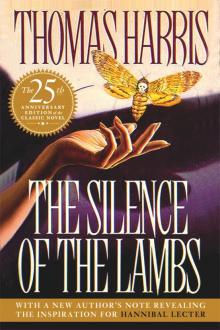 The Silence of the Lambs
The Silence of the Lambs Red Dragon
Red Dragon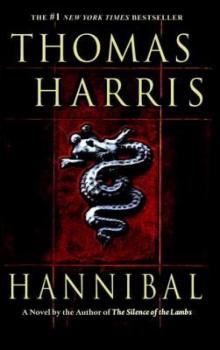 Hannibal
Hannibal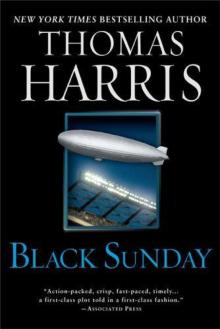 Black Sunday
Black Sunday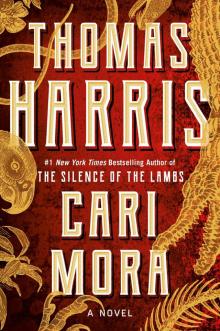 Cari Mora
Cari Mora Hannibal Rising
Hannibal Rising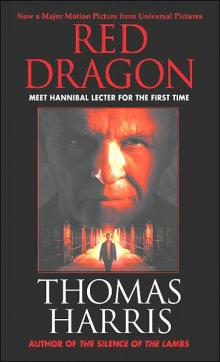 Red Dragon hl-1
Red Dragon hl-1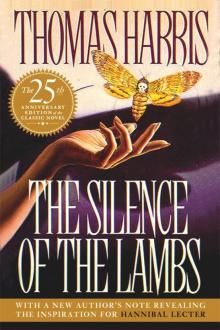 The Silence of the Lambs (Hannibal Lecter)
The Silence of the Lambs (Hannibal Lecter)